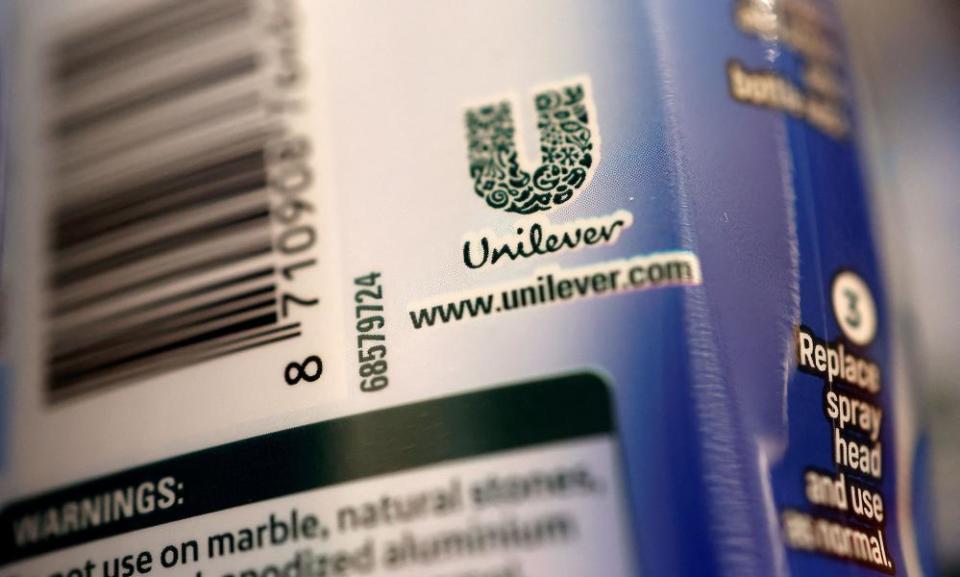Time for Unilever boss to concede lack of appetite for a big tilt

It’s one thing for Terry Smith to take a swipe (slightly unfairly) at Unilever management’s love of seeing purpose in mayonnaise, which was last week’s entertainment. The latest missile from Mauritius, which is where Smith resides while picking the stocks for his £29bn Fundsmith fund, is more serious and better-aimed.
Framed as a “postmortem” on Unilever’s abortive £50bn tilt at GlaxoSmithKline’s consumer products business, it was scathing on management, strategy, long-term performance and communication – all the big stuff.
The numbers didn’t add up on the GSK deal in terms of returns on capital, or not in a way Unilever was prepared to explain, argued Smith. Unilever’s share price has lagged rivals’ for years and management responds with “meaningless platitudes”. The new strategy of targeting beauty, oral care and over-the-counter medicines would take the company into areas where it has little expertise. Management – “or someone else if they don’t want the job” – should improve the current business before attempting new challenges.
This column would dispute the idea that acquiring the GSK business would have been a leap into the unknown. The logic wasn’t wacky. As the Jefferies analyst Martin Deboo put it, the widespread hostility to the deal would almost make you think Unilever had proposed buying a defence contractor rather than “a purveyor of toothpaste and headache remedies”. Quite.
Yet Smith’s advice to fix the current assets will resonate. His fund’s £800m investment represents a stake of slightly under 1%, but the lack of appetite for an enormous “transformational” deal is widely shared. That is the main lesson of this week.
The chief executive, Alan Jope, if he values his job, would be wise to concede as much when he unveils his latest strategic thinking next month. If he wants Unilever to be bigger in consumer health and beauty and smaller in food, the process will have to be gradual. Deal-making on a smaller scale needn’t be off the table, but shareholders primarily want to see hard operating improvements. There aren’t big bargains out there to justify the risk of betting the farm
The board of Unilever should also reflect that, under different chairs and different chief executives, it has badly misread the mood of shareholders twice in four years. The other occasion was the plan to incorporate solely in the Netherlands; a U-turn to the UK followed. It hardly helps that Nils Andersen is near-invisible compared with most chairs of top-10 FTSE 100 companies. He needs to get out and about: the repair job with investors is getting bigger by the day.
Par score set for GSK consumer unit
Smith, incidentally, also made a fair point when he said the GSK consumer unit now faced its own test. If £50bn was a “fundamental undervaluation”, which was the GSK board’s view of Unilever’s offer, a par score for valuation has been set. After the demerger happens in the summer, performance will be judged from that mark.
It would be unfair to expect the independent business, which has yet to be given a name, to deliver £50bn on day one. Analysts’ expectations, after all, were grouped around the £45bn level. But it will be expected within reasonably short order.
Entain can bide its time
2021 was “an eventful period” for Entain, says the chief executive, Jette Nygaard-Andersen, in the Ladbrokes and Coral group’s end-of-year trading update. You bet: the company received bids from two US suitors, both of whom eventually walked away.
Nygaard-Andersen could also have said it was correct to give both approaches a frosty reception. Entain does not need to sell itself because BetMGM, the bit that excites outsiders, is doing fine. In the gold rush that is the liberalising US market, its revenue rose fivefold last year to $850m. The figure still isn’t huge but if the US operation can achieve its long-term aim of keeping a 20-25% share of its market, Entain will eventually own half of a very substantial business.
The interesting sideline is what has happened to the two would-be bidders’ share prices since they tried their luck – a critical consideration since both offers mainly came in form of paper rather than cash. DraftKings’ has halved since September, and so is in no position to take a second run.
By contrast, MGM Resorts, Entain’s joint venture partner in the US, is up by a third. It is the only credible acquirer, just as seemed obvious last year, because the existing partnership is set. Marriage still looks a likely eventual outcome but time is on Entain’s side. Just let US market liberalise further.

 Yahoo Finance
Yahoo Finance 